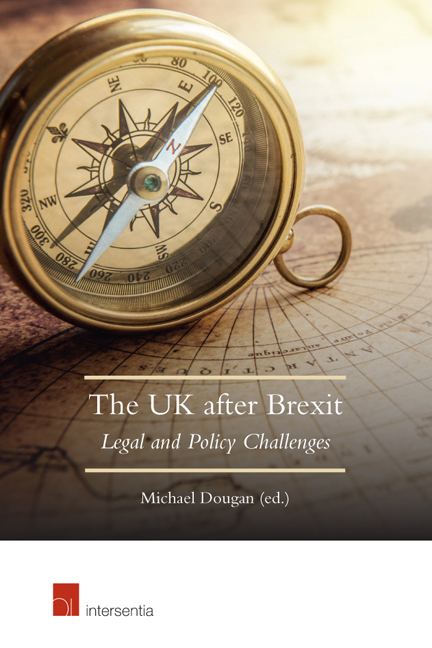Book contents
- Frontmatter
- Contents
- List of Authors
- Editor's Introduction
- Part I Constitutional Issues
- Part II Substantive Policies
- Part III External Relations
- Chapter 11 Membership of the World Trade Organization
- Chapter 12 UK Trade Policy
- Chapter 13 UK Foreign Investment Protection Policy Post-Brexit
- Chapter 14 Brexit and International Peace and Security: A Crisis for Crisis Management?
- Chapter 15 Brexit and Relations between the EU and the UK
- About the Editor
Chapter 12 - UK Trade Policy
from Part III - External Relations
Published online by Cambridge University Press: 13 October 2018
- Frontmatter
- Contents
- List of Authors
- Editor's Introduction
- Part I Constitutional Issues
- Part II Substantive Policies
- Part III External Relations
- Chapter 11 Membership of the World Trade Organization
- Chapter 12 UK Trade Policy
- Chapter 13 UK Foreign Investment Protection Policy Post-Brexit
- Chapter 14 Brexit and International Peace and Security: A Crisis for Crisis Management?
- Chapter 15 Brexit and Relations between the EU and the UK
- About the Editor
Summary
SETTING THE SCENE: WHAT IS TRADE POLICY?
Although there is still a great deal of uncertainty over the UK's future relationship with the EU, the most likely post-Brexit options involve the UK leaving the EU's customs union and consequently no longer being bound by its common commercial (trade) policy. This chapter will proceed on the basis of that assumption, and therefore that the UK will need to determine its own trade policy and negotiate a whole range of new trade relationships.
The future UK-EU relationship will have an impact on UK trade policy in another way. Were the UK to remain a member of the EU's single market, continuing as a result to apply the EU's regulatory systems for goods and services, then goods and services coming from third countries into the UK market would find it easier to access the EU market; as a consequence a trade agreement with the UK would be more attractive (not as attractive as it would be if the UK were still a Member State, but more attractive than if the UK were outside the single market). The Government has indicated that it does not envisage continued membership of the single market, and this chapter will assume that this policy will not change.
These assumptions are based on the Government's White Paper on exiting the EU, published on 2 February 2017, which states:
‘We will not be seeking membership of the Single Market, but will pursue instead a new strategic partnership with the EU, including an ambitious and comprehensive Free Trade Agreement and a new customs agreement.
After we have left the EU, we want to ensure that we can take advantage of the opportunity to negotiate our own preferential trade agreements around the world. We will not be bound by the EU's Common External Tariff or participate in the Common Commercial Policy.
- Type
- Chapter
- Information
- The UK after BrexitLegal and Policy Challenges, pp. 247 - 266Publisher: IntersentiaPrint publication year: 2017



